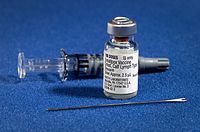
Photo from wikipedia
Vaccines have been highly successful in the management of many diseases. However, there are still numerous illnesses, both infectious and noncommunicable, for which there are no clinically approved vaccine formulations.… Click to show full abstract
Vaccines have been highly successful in the management of many diseases. However, there are still numerous illnesses, both infectious and noncommunicable, for which there are no clinically approved vaccine formulations. While there are unique difficulties that must be overcome in the case of each specific disease, there are also a number of common challenges that have to be addressed for effective vaccine development. In recent years, bacterial membrane vesicles (BMVs) have received increased attention as a potent and versatile vaccine platform. BMVs are inherently immunostimulatory and are able to activate both innate and adaptive immune responses. Additionally, BMVs can be readily taken up and processed by immune cells due to their nanoscale size. Finally, BMVs can be modified in a variety of ways, including by genetic engineering, cargo loading, and nanoparticle coating, in order to create multifunctional platforms that can be leveraged against different diseases. Here, an overview of the interactions between BMVs and immune cells is provided, followed by discussion on the applications of BMV vaccine nanotechnology against bacterial infections, viral infections, and cancers.
Journal Title: Advanced drug delivery reviews
Year Published: 2022
Link to full text (if available)
Share on Social Media: Sign Up to like & get
recommendations!